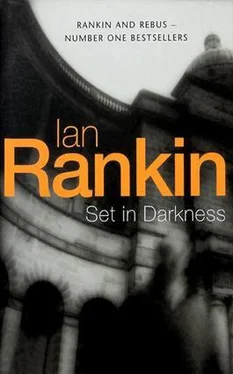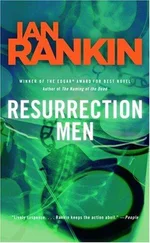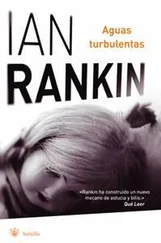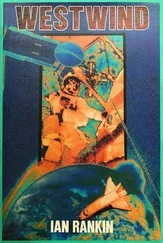‘You’ll be going somewhere warm,’ Rebus told him. ‘Might even be a bit too warm.’
‘And you’re on the side of the angels, eh?’ They were heading for the car now. Rebus stopped; his Saab was parked the other side of the chapel. Cafferty didn’t check; he half waved and kept on walking. ‘Next funeral I go to will probably be yours, Strawman. Anything you want put on your headstone?’
‘How about “Died peacefully in his sleep, aged ninety”?’
Cafferty laughed with the confidence of the immortal.
Rebus turned, retraced his steps. He was out in the open, and his shoulders jerked when he heard a sharp report, but it was only the Weasel slamming shut the door of the Jag. Rebus walked round to the front of the chapel, opened the door and stepped inside. There was an anteroom, a big book of remembrance open on a marble-topped table. A red silk marker kept it open at the day’s date on the previous year: eight names, meaning eight cremations that day, eight grieving families who might or might not turn up to pay their respects. No... that wasn’t right. Not the date of cremation... these were dates of death. He kept the place but started at the back of the book, letting the as-yet-empty sheets slide through his fingers. There’d be names in there eventually. If Cafferty was right, his wouldn’t be among them: he’d just disappear. He didn’t know how he felt about that. Didn’t feel anything really. Today’s date: no names entered as yet. But cars had been pulling away as he’d been arriving, a teenager peering out at him from the back seat of a limousine, black tie knotted awkwardly at the throat.
Yesterday: no names; too soon. Day before that: none. Then it was back to the weekend. Friday: nine names — the cremations had probably taken place yesterday. Rebus looked down the list, neat entries made in black ink by someone with a gift for calligraphy. Fountain pen: thick downstrokes, tapering flicks. Dates of birth, maiden names...
Bingo.
Robert Wallace Hill. Known as Rab.
He’d died the previous Friday. The funeral had probably taken place yesterday, the ashes scattered over the garden of remembrance: the reason Cafferty had come here, paying his respects to the man who’d been his ticket out of jail. Rab, his body riddled with cancer. Rebus saw it all now. Rab, with his release date coming, the cancer a cruel blow. Taking the news back to the Bar-L, confiding in Cafferty, who’d feigned illness, gone for tests himself, arranging the switch of records, some bribe or threat to a doctor. Rab pumped full of painkillers, his release date almost coinciding with Cafferty’s. Doubtless paid well: money for a decent send-off, an envelope thick with banknotes finding its way to any family left behind.
Rebus somehow doubted Cafferty would return to the chapel a year down the line. He’d have more important things on his mind. He’d be back in business. And Rab? Well, hadn’t Cafferty said it himself: a time for looking forward, not back . Christmas was on its way. 1999 would bring the Scottish Parliament back to Edinburgh. In the spring, they’d flatten the old brewery, start constructing the glass boxes which would eventually house the MSPs. Glass walls: the theme was openness, accountability. Okay, till then they’d be meeting in a church hall on The Mound, but even so...
Even so. So what?
‘And then you die,’ he muttered to himself, turning to leave the chapel.
He got on his mobile to the mortuary, asked Dougie who’d done the autopsy on Rab Hill. The answer: Curt and Stevenson. He thanked Dougie, punched in Curt’s number. He was thinking of Rab’s body: ashes now. Where there’s no body, there’s no crime . But there’d be the autopsy report, and when it showed up the cancer, Rebus would have evidence enough to have Cafferty re-examined.
‘It was an overdose,’ Curt explained. ‘He’d been a user in prison, got a bit too greedy when he came out.’
‘But when you opened him up, what else did you find?’ Rebus was holding the phone so tightly, his wrist was hurting.
‘Family were against it, John.’
Rebus blinked. ‘A young man... suspicious death.’
‘Some religious thing... church I’d never heard of. Their lawyer put it in writing.’
I’ll bet he did, Rebus thought. ‘There was no autopsy?’
‘We did as much as we could. Chemical tests were clear enough...’
Rebus cut the call, screwed shut his eyes. A few flakes of snow fell on his lashes. He was slow to blink them away.
No body, no evidence. He shivered suddenly, remembering Cafferty’s words: Yes, I heard you’d been asking . Asking about Rab Hill. Cafferty had known... known that Rebus knew. So easy to administer an overdose to a sick man. So easy for someone like Cafferty, someone with so much to lose.
The few days running up to Hogmanay were a nightmare. Lorna had sold her story to a tabloid — Model’s Night-Time Romp With Murder Case Cop. Rebus’s name hadn’t been mentioned... not yet.
It was a move which might ostracise her from husband and family alike, but Rebus could see why she’d done it. There was a middle-page spread, showing her to her best in diaphanous clothing, face and hair done to the nines. Maybe it was the relaunch she thought she needed. Maybe it was a case of using what she had.
A moment’s notoriety.
Rebus could see his career crumbling before him. To keep herself in the news, she’d have to name names, and Carswell would pounce. So Rebus went to see Alasdair, and made him a proposition. Alasdair phoned his sister at High Manor, talked her round. They were on the phone forty minutes, at the end of which Rebus handed Alasdair’s passport back and wished him good luck. He’d even driven him out to the airport. Grieve’s parting words to him: ‘Home in time for New Year.’ A handshake and a brief wave of farewell. Rebus had felt obliged to warn that they might need him back to give testimony. Grieve had nodded, knowing he could always refuse. Either that or keep moving...
Rebus wasn’t working on Hogmanay. A trade-off because he’d been on call over Christmas. The town had been quiet, which hadn’t stopped the cells filling up. Sammy had sent him a present: the CD edition of the Beatles’ White Album . She was staying down south, visiting her mum. Siobhan had left her present to him in his desk drawer: a history of Hibernian FC. He flicked through it during the dead hours, hours when he’d no need to be at the station. When he wasn’t reading about the Hibs, he was poring over case-notes, trying to restructure them into something more acceptable to the Procurator Fiscal. He’d had a series of meetings with various advocates depute. So far, they were of the opinion that the only person they could try with any hope of securing a conviction was Alasdair Grieve: accessory to... fleeing the scene of...
Another good reason for putting Grieve on the plane.
And now it was Hogmanay, and everyone was talking about how bad the television had been. Princes Street would fill tonight, maybe two hundred thousand revellers. The Pretenders were playing, almost reason enough to go along, but he knew he’d stay home. He wasn’t risking the Ox: too close to the mayhem, and getting there would be difficult. Barriers had been erected, ringing the city centre. So he’d headed to Swany’s instead.
When he was a kid, all the mothers would be out bleaching their front steps, busy house cleaning: you had to see the New Year in with a clean house. There’d be sandwiches and stovies for the drinkers. Chimes at midnight: someone tall and dark waiting outside, carrying bottle and lump of coal, plus something to eat. Welcoming the New Year with a knock at the door. Songs and ‘doing a turn’. One of his uncles had played harmonica, an aunt might sing with a tear in her eye, a catch in her throat. Tables groaning with black bun and shortie, Madeira cake, crisps and peanuts. Juice in the kitchen for the kids, maybe homemade ginger beer. Steak pie sitting in the oven, waiting to be cooked for lunch. Strangers would see a light on, knock and be welcomed in. Anyone was welcome into your home, on that night if no other.
Читать дальше












